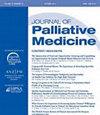关于生成智能的未来,姑息治疗临床医生应该知道的十大建议。
IF 2.1
3区 医学
Q2 HEALTH CARE SCIENCES & SERVICES
引用次数: 0
摘要
人工智能(AI)正在改变医疗保健,并对姑息治疗(PC)和严重疾病沟通(SIC)产生影响。本文整合了跨学科和跨专业的专业知识,为PC临床医生提供了关键提示,以最好地利用人工智能驱动的工具来提高PC实践、护理效率和以患者和家庭为中心的结果。人工智能驱动的工具包括预测分析,以改善干预措施的提供,以及人工智能辅助的沟通和护理目标的记录。除了这些潜在的好处之外,还有重要的道德、后勤和公平方面的考虑,必须仔细处理。本文章由计算机程序翻译,如有差异,请以英文原文为准。
Top Ten Tips Palliative Care Clinicians Should Know About the Future of Artificial Intelligence.
Artificial intelligence (AI) is transforming health care and has implications for palliative care (PC) and serious illness communication (SIC). This article integrates interdisciplinary and interprofessional expertise, providing key tips for PC clinicians to best leverage AI-driven tools to enhance PC practices, care efficiency, and patient- and family-centered outcomes. AI-driven tools range from predictive analytics to improve intervention delivery to AI-assisted communication and documentation of goals of care. Beyond these potential benefits are important ethical, logistical, and equity considerations that must be carefully addressed.
求助全文
通过发布文献求助,成功后即可免费获取论文全文。
去求助
来源期刊

Journal of palliative medicine
医学-卫生保健
CiteScore
3.90
自引率
10.70%
发文量
345
审稿时长
2 months
期刊介绍:
Journal of Palliative Medicine is the premier peer-reviewed journal covering medical, psychosocial, policy, and legal issues in end-of-life care and relief of suffering for patients with intractable pain. The Journal presents essential information for professionals in hospice/palliative medicine, focusing on improving quality of life for patients and their families, and the latest developments in drug and non-drug treatments.
The companion biweekly eNewsletter, Briefings in Palliative Medicine, delivers the latest breaking news and information to keep clinicians and health care providers continuously updated.
 求助内容:
求助内容: 应助结果提醒方式:
应助结果提醒方式:


